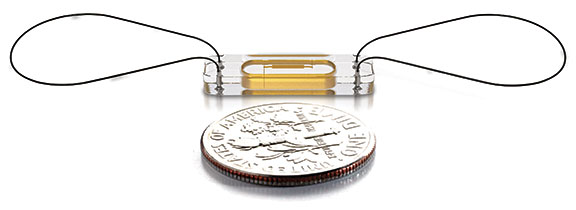First Implantable Wireless Hemodynamic Monitoring Device Shown to Reduce Hospitalizations
The CardioMEMS™ HF System is the first Food and Drug Administration (FDA)-approved heart failure (HF) monitor proven to significantly reduce HF hospital admissions and improve quality of life in NYHA class III patients.1 This implanted, wireless, battery-free device measures key vital signs, including pulmonary artery pressure in HF patients, and transmits this information remotely to the patient’s doctors for proactive management. The device was evaluated in 550 people in the CHAMPION (CardioMEMS Heart Sensor Allows Monitoring of Pressure to Improve Outcomes in NYHA Class III Patients) trial; Penn State Health Milton S. Hershey Medical Center participated as an active enrolling center. During 15 months of follow-up, the treatment group had a 39 percent reduction in heart failure-related hospitalization compared with the control group.1

CardioMEMS Heart Failure Sensor. CardioMEMS and St. Jude Medical are trademarks of St. Jude Medical, Inc. or its related companies. Reprinted with permission of St. Jude Medical, ©2015. All rights reserved.
To participate, patients must have been hospitalized for HF in the 12 months prior. “That defines a relatively unstable population,” says John P. Boehmer, MD, Penn State Heart and Vascular Institute. Once implanted, the CardioMEMS device requires patients to lie on a special mat every day. The mat includes an antenna that wirelessly connects and transmits data securely to a monitor that records 18 seconds of a pulmonary pressure tracing.
“The goal is to keep heart failure patients out of the hospital, managing any potential issues before they become problematic. CardioMEMS is a diagnostic tool that allows us to do that,” continues Boehmer. Typically, when clinicians observe an elevation in pulmonary arterial pressure, they adjust the dosages of diuretics and possibly other cardiac medications to decrease fluid and sodium build-up and reduce pressure.
The study met its pre-specified endpoints, often by a large margin, adds Boehmer, but the FDA expressed concern regarding the possible influence of nurse communications in the CardioMEMS group.2 Consequently, researchers conducted a long-term single-blind follow-up after the initial assessment at six months.1 This follow-up demonstrated that 84 percent of the recommendations included in a nurse communication were not associated with a medication change.2
The team at Hershey Medical Center plans to utilize CardioMEMS for long-term follow-up of patients with particularly challenging cases. These challenging cases may include patients that develop heart failure-related problems without the concomitant increase in weight, which is usually indicative of fluid retention. Boehmer states, “CardioMEMS is not a therapy in itself. It needs to connect to a system that can provide the appropriate therapy that produces the desired outcomes in response to changes in the patient’s condition.” Medical centers also need to consider the “back end” of the device, identifying how the data will be stored and disseminated. This vital data has the potential to revolutionize the treatment of heart failure, preventing acute episodes that would otherwise require patients to be readmitted to hospitals.

John P. Boehmer, MD
Associate Dean for Faculty Affairs, Penn State College of Medicine
Professor, Department of Medicine
Director, Heart Failure Program, Penn State Heart and Vascular Institute
Phone: 717-531-8407
Email: jboehmer@psu.edu
Fellowship: Cardiovascular medicine, Johns Hopkins University Hospital, Baltimore, Md.
Residency: Internal medicine, University of Massachusetts Medical Center, Worcester, Mass.
Medical School: Penn State College of Medicine, Hershey, Pa.
Connect with John P. Boehmer, MD, on Doximity
References:
- Abraham WT, Adamson PB, Bourge RC, et al. Wireless pulmonary artery haemodynamic monitoring in chronic heart failure: A randomised controlled trial. Lancet. 2011;377(9766):658-66.
- CardioMEMS Champion HF Monitoring System PMA Amendment P100045; FDA and CardioMEMS Panel Package Prepared for the October 9, 2013 Circulatory System Devices Panel Meeting.
